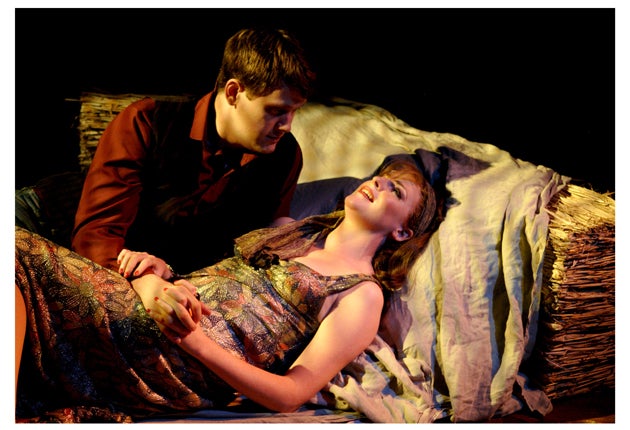Aspects of Love, Menier Chocolate Factory, London
Passion play wins a place in the heart

You may remember "Love Changes Everything", the song from Aspects of Love that Michael Ball took to the top of the charts 20 years ago.
It's the most rousing item in a musical by Andrew Lloyd Webber, with lyrics by Charles Hart and Don Black, that is, in effect, a tapestry, or profusion, of ingeniously interwoven musical ideas with several other stand-out songs.
Aspects, though, is not a stand-and-deliver sort of show. It's a carefully impassioned treatment of a 1955 bohemian novella by the minor Bloomsbury writer David Garnett, a charming bisexual who married the daughter of his male lover, the painter Duncan Grant.
Suitably enough for Garnett's vaguely autobiographical tale of endless, amoral bed-hopping, it's a chamber musical, and Trevor Nunn (who directed the original in the West End) has dived between the sheets once more in the tiny dormitory theatre in Southwark, the Menier.
This brilliant little revival is a musical mini-masterpiece, with a score of insinuating beauty and real emotional muscle in which the characters in a daisy chain of love across the French Pyrenees, in Paris and Venice and first in Montpellier, just after the war, express their passions and yearning in a through-sung melodic melisma.
Garnett's hero, Alex Dillingham, becomes infatuated with the daughter of his lover, the actress Rose Vibert. She, in turn, is obsessed with Alex's uncle, George, a louche and hedonistic art forger.
And George's squeeze, Marchesa Giuletta Trapani, advocates a draft of wine and a throw of the dice at the old boy's funeral – before nabbing Alex herself as he dusts himself down after a roll in the haystack with Rose's daughter.
Everyone's out to bed Alex, who resembles Terence Stamp in Pasolini's Teorema. When Stamp finished working his way through all the members of one family, a man at the back of the cinema I was sitting in shouted out, "What about the dog?"
It's a testament to Lloyd Webber's music, and to Nunn's nuanced psychological staging, that you don't feel a similar sense of disgust. And Michael Arden, a young Broadway singer making his London debut, even makes Alex sympathetic, if not all that likeable, by the simple expedient of playing him quietly and thoughtfully. He sings beautifully, too.
He's well matched by Katherine Kingsley as Rose, Dave Willetts as old George and Rosalie Craig as Giuletta, though Nunn is also doing here what he does better than anyone else: forging an instant ensemble, organically dedicated to the piece, from Martyn Ellis's bulwark of an actor manager right through to Louisa Lydell as a pert housekeeper and Dominic Tighe as a handsome, slightly miffed (because he's thrown over) minor love interest.
The score has been cunningly re-orchestrated for just seven players by David Cullen, weaving through major songs with recurring motifs, poignant underscoring and a good helping of French folk song and tender, rhapsodic bridge passages. David Farley's set is a panelled wall of paintings, photos and apertures, with evocative views of the Pyrenees. It's all very simple, and all achieved, like the performance, to an unusually high standard.
To 26 September (020 7907 7060)
Join our commenting forum
Join thought-provoking conversations, follow other Independent readers and see their replies
Comments
Bookmark popover
Removed from bookmarks